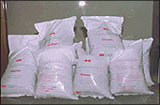The Rediff Special/ Ramesh Menon

If there is an oil spill near you, do not panic. There is now a bug that will eat up the oil. The end result: Within three to four months, the land will be as clean and rich as it was before the spill.
Most of us will not forget one tragic aftermath of the Gulf War -- birds drenched in oil, partially blinded by it, struggling to fly. Or all those documentaries on the National Geographic and Discovery television channels, showing mass deaths of animals and birds because of various oil spills around the world.
The Gulf War, in particular, proved to be a wake-up call for the Indian government, which sanctioned a study to see how oil spills could be tackled. Scientists at the New Delhi-based Tata Energy Research Institute, who were assigned the task, decided the best thing they could do was follow Nature. After all, even if it took time, Nature did take care of oil spills and revive the land.
The TERI scientists also took a leaf from Dr Ananda K Chakraborthy's book. In the seventies, this NRI scientist had developed genetically modified bacteria that fed on oil spills and cleaned it up. Using that as a pointer, the TERI scientists developed a sludge-degrading agent which, to put it simply, were just five different strains of bacteria whose diet is limited to a variety of organic, carbon-based compounds found in oil.
It worked wonders during the trials, so they called it the Oilzapper.
TERI, with the support of the department of biotechnology, developed the Oilzapper after six years of research and demonstrated it by treating nearly 5,000 tonnes of sludge at the Mathura, Barauni, Digboi and Bombay. The refineries, which earlier did not exhibit much interest in the discovery, are now considering getting the technology to grow the bugs themselves.
These microbes offer new hope to the oil industry -- to clean spills, storage areas and degenerated areas around harbours, oil refineries and oil depots. Take, for example, the Digboi refinery in Assam. Served with a closure notice by the Assam Pollution Control Board in early March for several oil spills, it is now desperately trying to use the Oilzapper to clean up the affected farmlands around its refinery.
Says Vibha Dhawan, dean, bioresources and biotechnology, TERI: "Nature cleans up oil spills, but it takes a long time. What we did was to was to collect microbial population from the soil and find out which one degrades the oil. By using special nutrients and things like that, we created conditions for faster multiplication of these bugs. The refineries are excited about the Oilzapper technology as they will save a lot of money and get rid of environmental dangers."
When oil is stored for a long time, its sludge settles at the bottom and has to be removed. Presently, refineries dump the sludge into another tank, the construction of which costs them approximately Rs 10 million. Alternately, refineries spend around Rs 3,000 per tonne to build pits, where the sludge is dumped. As demand increases and the oil industry grows, they will be handicapped by lack of land to build such storage tanks. But the Oilzapper tests on sludge have proven to be an effective and, at Rs 800 per tonne, a cheaper alternative.
 The microbes eat up the harmful chemicals, forming carbon dioxide that escapes into the air. The less toxic substances that are left behind are easily handled, so the affected site can soon be reused. It also prevents pollution of groundwater. And, most important of all, it can be packed in polybags and transported to the affected areas.
The microbes eat up the harmful chemicals, forming carbon dioxide that escapes into the air. The less toxic substances that are left behind are easily handled, so the affected site can soon be reused. It also prevents pollution of groundwater. And, most important of all, it can be packed in polybags and transported to the affected areas.
According to some assessments, there are around 15 refineries in India and they generate around 20,000 tonnes of sludge annually. Many of them have been carelessly dumping the sludge in pits, without any consideration for the resultant pollution of ground water. But, with stricter implementation of pollution laws and increasing awareness among the villagers who live around the refineries, better environmental methods will now have to be followed. The closure notice to the Digboi refinery is just the beginning.
Banwari Lal, research fellow, TERI, who worked on the Oilzapper, points out: "The refineries are now facing a major problem in the form of the sludge they have collected over the years. It is only something like the Oilzapper that can help them get rid of it without harming the environment."
TERI has licensed its Oilzapper technology for bioremediation of hazardous substances from petroleum refinery wastes to Sriram Biotech Ltd, Hyderabad. It is estimated that around 20 tonnes of the product would be required to deal with the sludge that is annually generated in India.
TERI -- which was formed in 1974 to promote efficient energy use, energy technologies and reduction of all forms of waste -- is now going a step further. On the basis of their current research, they have begun to look into the possibility of using bacteria to revive nearly dead oil wells. If their research is successful, bacteria will be used to create conditions within the oil well that will force out the oil trapped between the rocks. TERI scientists believe they will soon see a breakthrough in this project as well.
Design: Dominic Xavier
The Rediff Specials